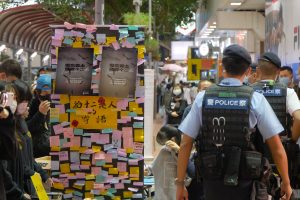[ad_1]

Hong Kong police walk by a display of sticky notes expressing support for the “Hong Kong 12,” Nov. 30, 2020.
Credit: Flickr/ Studio Incendo
Last week, just before the new year, Chinese authorities sentenced a group of Hong Kong protesters who had attempted to flee the city by boat to between seven months and three years in prison.
The trial marked the end of a long saga that began when the protesters – known as the “Hong Kong 12” by supporters and “separatists” by authorities – were caught and arrested at sea in August while trying to escape by speedboat to Taiwan. After months of being detained without charges, Tang Kai-yin, 31, was sentenced to three years and fined 20,000 renminibi (RMB), roughly $3,100, while Quinn Moon, 33, was given two years and fined 15,000 RMB for organizing the crossing. Eight others on the boat received seven months and fines of 10,000 RMB each; two minors were released to Hong Kong police.
The arrests were a flashpoint in Hong Kong’s beleaguered pro-democracy movement, sparking international outrage and solidarities in Thailand, Taiwan, the U.S., the U.K. and elsewhere. It has also thrown a spotlight onto the treatment of detainees in China’s traditionally opaque judicial system. The group’s family members and human rights organizations have criticized authorities for denying the 12’s access to lawyers chosen by family, as well as for holding the trial behind closed doors, despite multiple requests for access from relatives and foreign diplomats.
Yet the case has significance beyond these points. For many following both domestically and internationally, it served as a barometer for the level of seriousness Chinese authorities attribute to such crimes, in what activists have been calling a new era of crackdowns on dissent following the passing of a sweeping national security law in June. One of the passengers was Andy Li, an activist and former member of a commission established to monitor the 2019 district elections, who had been arrested on suspicion of colluding with foreign forces under the national security law two weeks prior to the illegal crossing.
In the days surrounding the trial, there was international pressure from various sides. A week before, families of the group published an open letter calling for access to the trial and other demands. On December 28, U.K. Foreign Secretary Dominic Raab released a statement expressing “deep concern,” stating: “We expect China to uphold the role of law and conduct trials in a fair and transparent manner, consistent with the basic requirements of international human rights law.” Following the sentencing, U.S. Secretary of State Mike Pompeo also called the Hong Kong authorities “lackeys” of the Chinese Communist Party who had “destroyed” rule of law and “eviscerated the Hong Kong people’s freedoms.”
The sentences also garnered mixed reactions in politically-divided Hong Kong. Pro-Beijing politicians and lawyers claimed that the sentences had been appropriate or lenient, whereas those on the opposite side of the political spectrum believed they were too severe and warned of a chilling effect. More broadly, the case has invigorated discussions over the importance of Hong Kong’s traditionally independent judiciary – in contrast to Beijing’s opaque system – which for many has become the last battleground for rights in the city.
For some, the ramifications of this case may be more far-reaching than previously expected. On January 4, Chinese authorities threatened to strip the licenses of Lu Siwei and Ren Quanniu, two human rights lawyers who were hired by families of the group of 12 but prevented from representing them.
Lu received a letter from the Department of Justice in Sichuan informing him that he was accused of publishing “inappropriate speech online on multiple occasions.” Ren, who represented Zhang Zhan – a citizen journalist sentenced to four years in prison after reporting on the coronavirus outbreak in Wuhan – was sent a notice from the Department of Justice in Henan saying he faced disbarment over a 2018 case concerning a member of the banned spiritual group Falun Gong, the New York Times reports. Both may request for a hearing within three days to plead their cases.
“For daring to go against the powers that be, and persistence in upholding the rights of the Twelve, the authorities have resorted to ending their professional career and cutting off their livelihoods,” families of the group wrote in a statement. “We urge Hongkongers not to forget that it is these lawyers who offer their selfless help to the families of the Twelve at the most hopeless hour.”
[ad_2]
Source link